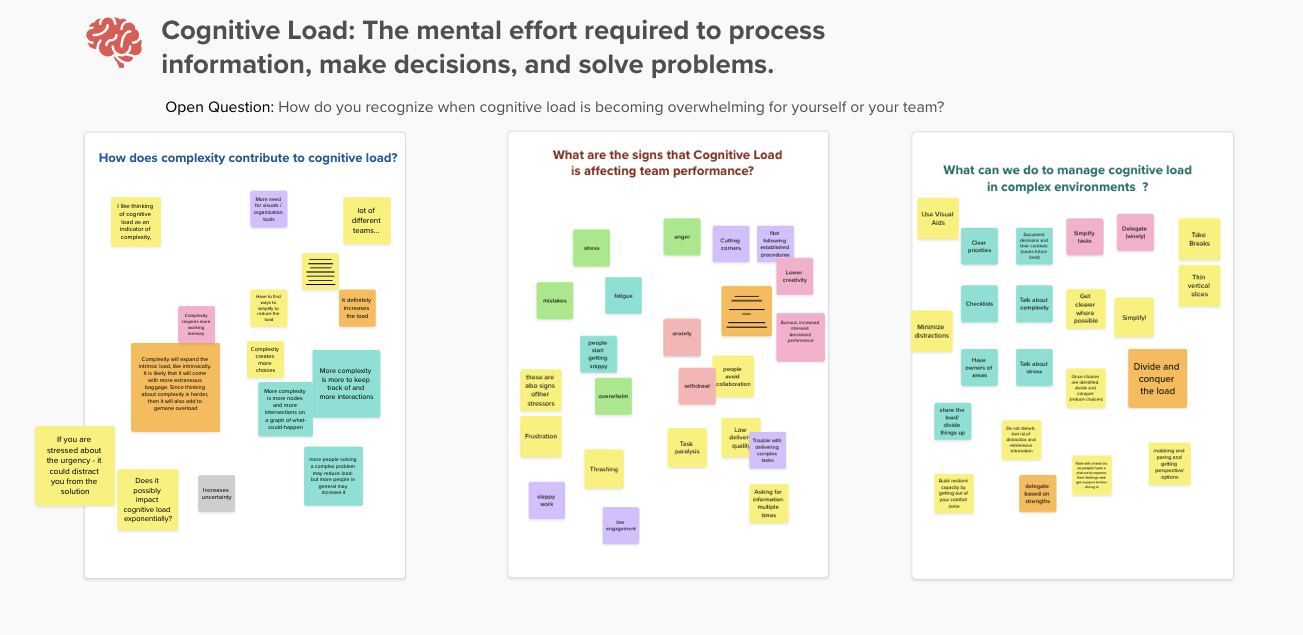By Ahmed Avais
“More people solving a complex problem may reduce load, but managing larger groups can increase it.”
In enterprise software development, complexity is a given. Whether working with federal agencies or private companies, Flexion’s teams face multifaceted, evolving challenges. And where there’s complexity, there’s cognitive load.
What is cognitive load? It is the mental effort required to process information, make decisions, and solve problems.
At Flexion, managing cognitive load is not just a necessity; it’s a skill we’ve honed over time. Recently, a colleague facilitated a session exploring this topic with input from teams across multiple projects. We used a Mural exercise to unpack how cognitive load impacts our daily work and to discover strategies for managing it.

The session centered around three key questions:
- How do you recognize when cognitive load is becoming overwhelming?
- How does complexity contribute to cognitive load?
- What can we do to reduce cognitive load in complex environments?
The insights we gathered were both varied and revealing, shedding light on how cognitive load manifests in our high-stakes projects.
Recognizing cognitive load
Imagine it’s crunch time. The codebase is vast, requirements keep changing, and the deadline is looming. How do Flexion teams know when cognitive load is no longer just a challenge but has become overwhelming?
The signs often start small. A team member who’s usually full of ideas falls silent during ensemble programming. Task completion slows down. Communication becomes terse. There’s an unspoken tension—like a stretched rubber band that might snap. Our teams identified several key indicators of cognitive overload:
- Increase in errors and a drop in work quality.
- Reduced creativity and slower delivery.
- More frequent miscommunications.
- Irritability or withdrawal among team members.
- Difficulty starting or completing tasks.
Research suggests that our working memory can typically hold about four items at a time, making it easy to understand how overwhelming cognitive load can impair performance (Cowan, 2001). Complex tasks that stretch memory demands too far can lead to task paralysis and increased error rates.
The complexity-cognitive load connection
In the Mural exercise, we explored how complexity drives cognitive load. The work we do is impactful precisely because it’s complex. But that same complexity also increases cognitive load. Here’s how complexity affects cognitive load:
- It requires more working memory.
- It creates decision paralysis with too many choices.
- It increases task difficulty, even for simple operations.
- It multiplies the interactions and outcomes we need to track.
- It amplifies uncertainty, adding stress to problem-solving.
As discussed in Cognitive Load Theory, intrinsic, extraneous, and germane cognitive loads all play a role in how complexity is managed (Sweller, Ayres, & Kalyuga, 2011). One participant summarized it well: “More complexity is more to keep track of and more interactions.”
How to manage cognitive load
How do we handle this? Flexion’s teams have developed strategies for cognitive load management, drawn from years of experience developing software for clients with complex needs. Here are some key approaches:
- Visual aids: We use flowcharts, diagrams, and collaborative online tools to reduce the cognitive load by offloading mental processing onto visual representations. This is essential in our remote work environment.
- Task segmentation: Breaking large projects into smaller, manageable parts helps us focus without being overwhelmed by the bigger picture. One technique we use is thin vertical slicing, allowing teams to focus on a piece of work while keeping the overall goal in mind.
- Clear communication: By maintaining clear, concise communication, we reduce misunderstandings and future cognitive load. “Clear priorities and documented decisions save future load,” as one team member said.
- Regular check-ins: Regular emotional check-ins help us identify cognitive overload early and provide support before diving into work.
- Collaborative coding: Practices like mob programming distribute the cognitive load across team members. However, as one participant noted, “More people can reduce load, but managing larger groups can increase it.”
- Simplification: We strive to simplify processes wherever possible. This doesn’t mean cutting corners; it means building solutions that focus on core problems first.
Cognitive load also increases with uncertainty, which can heighten stress levels (de Berker et al., 2016). By managing complexity with the right strategies, we help our teams navigate uncertainty and focus on problem-solving.
Finding the balance
Managing cognitive load is a balancing act. We need enough complexity to solve our clients’ intricate problems, whether they’re in government or private industry. But we must also avoid overwhelming our teams with that complexity. The goal isn’t to eliminate cognitive load—it’s to optimize it. We seek that sweet spot where challenge meets capability, where complexity drives innovation without causing frustration.
At Flexion, this balance is part of our daily process. It’s why federal agencies and private companies trust us with their most complex software projects. We don’t just manage complexity—we thrive in it. As we continue to push the boundaries of what’s possible, we’ll keep sharing our insights on managing cognitive load. It’s not only a way to deliver exceptional software but also to contribute to the broader conversation in our field. Want to collaborate with Flexion on a complex project? Get in touch with us!
Ahmed Avais is a Technical Delivery Leader at Flexion, specializing in digital transformation for government, finance, and healthcare sectors. With expertise in modern product management, agile methodologies, and human-centered design, Ahmed is also affiliated with the Human Systems Dynamics Institute, focusing on adaptability in complex systems. He lives in Apex, North Carolina, where he enjoys family life with his wife and four children, pursuing personal growth, Agile games, and outdoor adventures.




